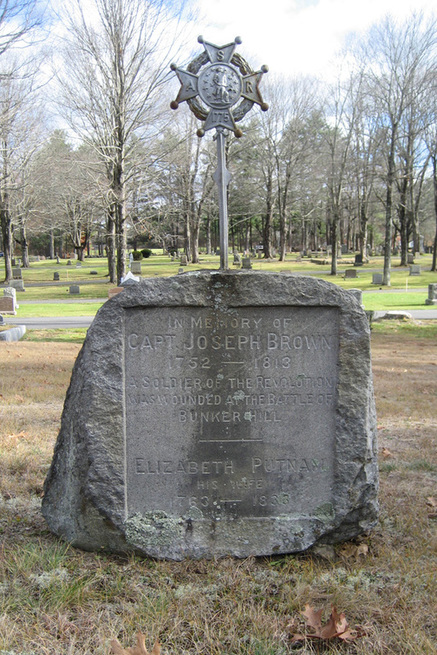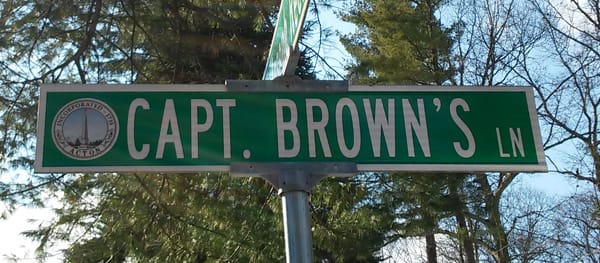|
The Society is collaborating on a project documenting all historical markers and memorials in the town of Acton. While researching the 1903 dedication of a memorial to Francis Barker, the drummer who marched to Concord's North Bridge with Isaac Davis’s company, we discovered that a stone was dedicated the same day in memory of Captain Joseph Brown, “one of Acton’s soldiers of the Revolution.” Following up, we found a Boston Daily Globe article (April 20, 1903) that called Captain Joseph “a prominent man in his time both in business circles and in town affairs.” Fletcher’s Acton in History lists Joseph Brown as an Acton man who “fought at Bunker Hill and Saratoga, and received a ball at Bunker Hill, which lodged in his body and was afterwards skillfully extracted and Brown shot it back at Saratoga.” (page 263) Fletcher also stated that Joseph Brown moved onto Captain Isaac Davis’s farm. Relatively little attention today seems to be given to the Acton men who served in the Revolution after the North Bridge Battle. We decided to learn more about Captain Joseph Brown, starting with the information on the memorial stone. Captain Joseph apparently was born in 1752. He was not born in Acton, and Brown was a common name, making research conclusions difficult. Fortunately, a great-great grandson Charles Leonard Brown's Sons of the American Revolution application stated that Joseph's parents were Joseph Brown and Grace Fairbanks. Joseph and Grace Brown lived in Stow, Massachusetts, and many of their children’s births were recorded in the 1733-1750 period. We have not been able to locate a birth or baptism record for Joseph, but his place in the family was confirmed in a probate record. Joseph Sr.’s will left to his son Joseph a colt, a saddle, and thirteen pounds, five shillings and eight pence to be paid out when Joseph reached the age of twenty-one (Middlesex County Probate file #3104). A guardianship paper (file #3105) stated that on 11 April 1769, Joseph’s son Joseph was in his 17th year, corroborating the 1752 birth date on Captain Brown’s stone.
Joseph grew up in a large family in which military service and leadership seem to have been the norm. His brothers Jabez (Ensign) and Joshua both participated in the French and Indian War, and starting April 19, 1775, at least four of the family’s sons served in the American Revolution, three as officers. We did not find Joseph in a list of Stow soldiers who were in the Concord fight on April 19, 1775. (See Crowells’ Stow, Massachusetts, 1683-1933.) However, Joseph did sign up to serve in Captain Samuel Patch of Stow’s company, part of William Prescott’s Regiment that was heavily involved in the action at Battle of Bunker Hill. His brother Joshua was the Lieutenant of the company. According to the Crowells’ history, the men of the company “contested their ground inch by inch with the red coats and when powder and bullets failed, emulating the example of Lieut. Brown, the Stow men gave them stones.” (page 73) Joseph was wounded and, fortunately, recovered. In the company roster of October 1775, Joseph’s rank was given as sergeant. The next recorded service of Joseph Brown was in March 1776 when he marched from Acton to Roxbury with Israel Heald’s Company to help end the siege of Boston. Joseph Brown married Dorothy Barker. Dorothy’s brother was Francis Barker, whose similar and nearby memorial stone was dedicated on the same day as Joseph’s. The marriage is not in Acton’s records or any Massachusetts records that we could find, although a June, 1776 New Hampshire record shows a marriage of Joseph Browne and Dorothy Barker by Reverend Samuel Cotton of Litchfield. (According to Hurd’s History of Hillsborough County, New Hampshire, Rev. Cotton was chaplain of the First New Hampshire Regiment for a time; perhaps there was a family or military connection.) Joseph and Dorothy’s first child Joseph was born in Acton in October, 1776. At some point, they moved onto the farm that had been owned by Isaac Davis when he led his company to Concord. Joseph Brown and his family lived there for many years. Nowadays, the property is associated with Isaac Davis; most people do not realize that another Revolutionary War soldier lived there as well. On January 1, 1777, Joseph Brown became an Ensign in his brother (Captain) Joshua Brown’s company in the Massachusetts 15th Regiment under Colonel Timothy Bigelow. Massachusetts Soldiers and Sailors in the War of the Revolution says that he served 27 months at that rank. The Company was apparently stationed January-August at Van Schaik’s Island. In the early fall 1777, they participated in the Battle of Saratoga. We have few details of Joseph’s service, but the story of his shooting back the ball with which he was wounded at Bunker Hill obviously survived in Acton lore. That winter, the Regiment was at Valley Forge, although online muster rolls indicate that Joseph Brown was on furlough January-May 1778. The 15th Massachusetts was involved in the Battle at Monmouth Courthouse on June 28, 1778. We were not able to discover whether Joseph Brown was back with his company by that time. Later that summer, the regiment participated in the Battle of Rhode Island. Joseph Brown was made first Lieutenant in April, 1779. His son Francis Barker Brown was born in May, 1779. One can imagine that Joseph’s military service caused hardship for wife Dorothy and his young children. In July, the warrant for Acton’s town meeting included Article 7, “To see if the Town will agree to Do Something Toward the Support of Lieut. Joseph Browns family while he is in the Publick Service.” (The town voted against helping his family.) Joseph Brown was made Captain in 1780 (different sources give somewhat different dates for that event). Muster rolls place Captain Joseph Brown’s company in Camp “Tenack” (presumably Teaneck, New Jersey) in July. He resigned his commission on November 15, 1780. After Captain Brown returned to Acton, more children followed: Nathaniel Greene (1781), Dorothy (1783) and Abigail (Oct. 12, 1784). Sadly, Captain Joseph’s wife Dorothy died October 19, 1784. Presumably, widower Joseph found help with caring for his young children during the 1780s. Town treasurer’s records during this period document payment to him for boarding a woman, almost surely someone poor, and for “Keeping School in his Society.” Unfortunately, we have no more information about either his School or his Society. Joseph Brown married Betsy Putnam of Stow in 1790. Acton records showed births to the couple of a second daughter Abigail (1790, died 1792), Samuel Putnam (1792), Betsey (1794), Luke (1796), Thomas (1798, died 1801), James (1800), Eunice (baptized 1803), and a second Thomas (1805). By the 1790s, town reports show that Captain Brown was very involved in town affairs. In addition to occasionally providing labor for the town, (such as digging a well or “transporting State arms to Boston”), he was chosen in various years to serve as town meeting moderator, highway surveyor, or fish warden. He boarded or provided wood for poor town residents. He was obviously held in high esteem in the community; he was appointed to many committees, often dealing with potentially (or actually) contentious issues such as overseeing and reconciling settlements and abatements for the town treasurer, settling on juror and voter lists, overseeing “cow pox” vaccinations, inspecting, redistricting, or selling off the town’s schools, and finding a site for a new meetinghouse (a political quagmire at the time). He was a member of the very early Social Library in Acton as evidenced by his being fined 4 cents in 1801 for two soiled pages in Pilgrim’s Progress. In 1803, Captain Brown was appointed tax collector and constable. He was paid one cent on the dollars he collected and was expected to serve as constable for free. He served in that capacity (in one year apparently “free from any expence to the Town”) until 1810 when he requested a replacement be found. It is not clear from town records why Captain Brown stepped down, but in the 1810-1811 period, he seems to have asked to be repaid for poll taxes that he had paid “a number of year back” and for some tax collection work that he had done, presumably for free. The town voted no. In April 1812, the town meeting warrant included an article about purchasing Captain Joseph Brown’s pew No. 30 in the meeting house. The article was dismissed. We have no way of knowing the circumstances. He had been relatively well-off, but he may have been land-rich and cash poor at the time. He may have been sick. We do know that he died August 9, 1813 in Acton. He died intestate; his affairs were handled by son Nathaniel Greene, yielding a 54-page probate file. Along with his personal possessions that included clothing, household goods, and furniture, he owned his farm (house, barn, well, fields, an orchard, livestock and farm implements), wood lots and unimproved land, meadow land, his pew #30 in the meetinghouse, and a horse stable on the Common near the meetinghouse. He also left debts totaling $1,091 that necessitated selling pieces of real estate to raise cash. It must have been a difficult period for his family. Captain Joseph’s son Samuel Putnam Brown, serving in the War of 1812, died in July, 1814. Joseph, Jr. died in February, 1815, leaving a widow and young children. Nathaniel seems to have taken care of the farm while wrapping up the estate’s affairs and providing for his own young family. When we starting researching Captain Joseph Brown, we had no idea where he came from, who his family was, or anything about his life other than the few mentions of him in Fletcher’s History. We were not confident that we would find records to flesh out his story. As it turns out, available records showed that Captain Joseph Brown lived quite a life of service. Though he was injured at Bunker Hill and had young children to provide for, he continued to serve in the military, a commitment that produced financial strain for his family. Once home, he served the town of Acton in a surprising variety of ways. Ninety years after his death, his grandson John M. Brown funded the erection of a memorial stone. On April 20, 1903, townspeople gathered for a dedication ceremony at Woodlawn Cemetery. A band played the “Star Spangled Banner” while a representative from the Bunker Hill Chapter, Daughters of the American Revolution, unveiled the Joseph Brown monument. For anyone interested in Acton sites with Joseph Brown connections, one can start at his memorial stone located in the “Revolutionary War” section of Woodlawn Cemetery to the left of the main gate. Acton Memorial Library's “Not Afraid to Go” exhibit has on display an epaulet that he wore during his military service, remarkably well-preserved. At 39 Hayward Road, one can see the Isaac Davis farm memorial stone that marks the farm where Isaac Davis and later Joseph Brown lived with their families. Farther down Hayward Road, one comes to the Minuteman Ridge Neighborhood. When it was developed in the 1960s, one of the streets was named “Captain Brown’s Lane.” Comments are closed.
|
Acton Historical Society
Discoveries, stories, and a few mysteries from our society's archives. CategoriesAll Acton Town History Arts Business & Industry Family History Items In Collection Military & Veteran Photographs Recreation & Clubs Schools |
Quick Links
|
Open Hours
Jenks Library:
Please contact us for an appointment or to ask your research questions. Hosmer House Museum: Open for special events. |
Contact
|
Copyright © 2024 Acton Historical Society, All Rights Reserved


 RSS Feed
RSS Feed